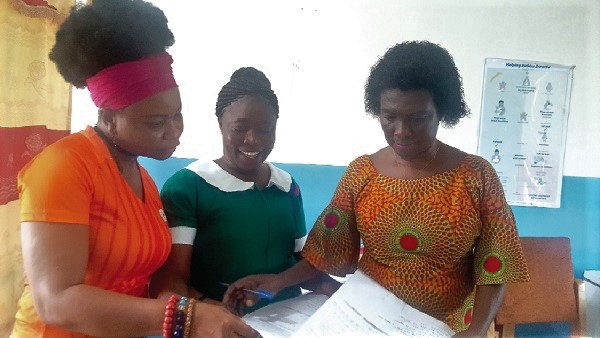
Making childbirth safe; Midwife innovates to save lives
As the midwife in charge of the Nkwaeso Health Centre in Techiman Municipal in the Bono East Region, Ms Veronica Ofosua Opoku attends to an average of 104 pregnant women in a month.
Between 10 to 15 of these pregnant women are always adolescents, with some being as young as 14 years.
Advertisement
The health centre started as a Community-based Health Planning and Services (CHPS) compound, and therefore lack all the facilities required to offer the full complement of services by a health centre.
Therefore, for Ms Opoku, improving the quality of health care services to ensure safe motherhood in the communities she serves is a daily struggle.
According to her, one aspect of her job that had proved challenging was how to sterilise instruments to decontaminate them after using them on body fluids, as the health centre does not have an autoclave.
Innovation
After participating in a 10-day Life Saving Skills (LSS) training designed to build the capacity of midwives in identifying and treating pregnancy related complications and emergencies, Ms Opoku became convinced about the importance of infection control in saving a woman’s life during childbirth and returned to her base to make a difference.
The training, facilitated by experienced doctors and midwives, was organised for midwives in the Bono East Region by the Ghana Health Service under the United Nations
Joint Programme on Empowering Adolescent Girls, being implemented by the United Nations Population Fund (UNFPA) with financial support by the Canadian government.
“During our discussions and practical lessons on infection control, I realised that I cannot compromise the infection control standards if I have to save lives. Nkwaeso Health Centre does not have an autoclave to sterilise equipment so I improvised a steriliser using an aluminium bowl with a very tight lid and a source of fire to decontaminate the equipment.”

The improvised steriliser, showing instruments ready for sterilisation
Training
Ms Opoku said she and the other midwives were trained in Focus Ante natal Care (FANC), Intermittent Preventive Therapy (IPT) using Sulphadoxine Pyrimethamine (SP) to prevent malaria in pregnancy, use of the partograph to record the progress of labour, anaemia in pregnancy and nutrition counselling to improve intake of Iron, folate and vitamin rich foods.
Others were infection prevention, how to manage the various stages of labour, Prevention of Mother to Child Transmission (PMTCT) of AIDS, manual removal of retained placenta, episiotomy, hypertensive disorders in pregnancy, vacuum delivery and how to effectively use the Maternal and Child Health Record Book (MCHRB).
Objectives
Specifically, the objectives of the training was to train the midwives to be able to detect and manage high-risk conditions arising during pregnancy, whether medical, surgical or obstetrics.
It was also to equip them with skills to conduct safe delivery of a full term healthy baby with minimal stress or injury to mother and baby and to conduct proper management of the four stages of labour
The Deputy Director of Nursing Services, Public Health (DDNS-PH) in the region, Ms Judith Twumasi, said participants were taught how to recognise obstetric emergencies and the skills to manage them, prevention of Post-Partum Haemorrhage, a common cause of maternal deaths, Essential Newborn Care and helping babies breathe, breastfeeding a baby and recognising severe jaundice.
They further undertook practical lessons at the Sunyani Regional Hospital.
She indicated that the training should be an opportunity for participants to mentor and train other colleagues not present at the training.
Adolescent corner
The Physician Assistant at the Health centre, Ms Geda Kankam Afosaa, said teenage pregnancy in the area was high.
Aside the teenage pregnancies, the youth in the community also report to the health centre with Sexually Transmitted Infections (STIs), she added.
Ms Kankam Afosaa said the management of the health centre had created an adolescent friendly corner which provideds counselling and services to adolescents in the community.



